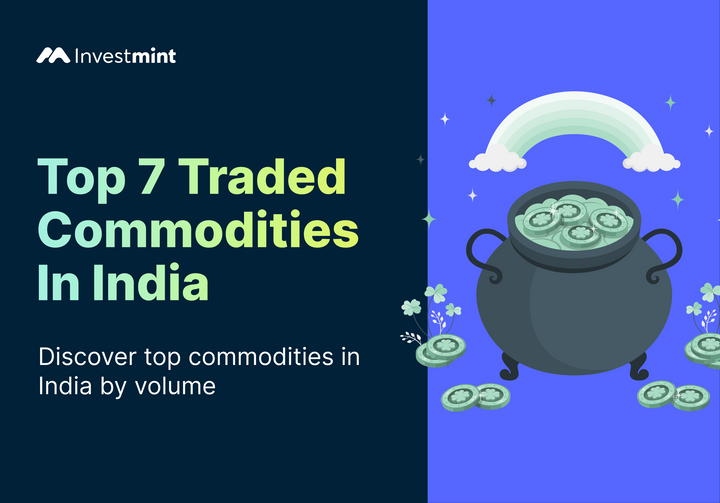What Are Capital Market Instruments And Which Ones You Can Trade?
Everything about the money market, financial instruments, and capital markets in India, is here. Click and learn more.

All About Capital Market Instruments
In the complicated field of finance, a foundational understanding of capital market instruments is nothing short of an imperative for both seasoned traders and budding investors. Capital market instruments are tools that help people buy and sell pieces of companies, lend money to governments and businesses, and even bet on the future values of assets like stocks and commodities.
In 2023, the total market capitalisation of global stock markets exceeded $108.23 trillion, underscoring the enormity of trading activities worldwide. This data is evidence of the ceaseless activity of financial markets worldwide. To become an experienced trader dealing with stock and securities in such a huge market, it is essential to educate yourself on terms like financial instruments, money market types, capital market features, etc.,
So, in this article, let us help you understand Capital Market Instruments, and we will also cover the money market instruments in India.
What Is Capital Market?
A capital market is a financial market where individuals, companies, and even governments can purchase and sell financial instruments like bonds, shares, ETFs, etc. These instruments represent ownership or debt in a company, government, or other entities. The capital market is important in ensuring the flow of funds in the economy. It connects investors with surplus capital and entities requiring capital for various purposes.
What are the Functions of a Capital Market?
A capital market is like a financial engine that has various functions. Let’s have a look at those functions:
- Capital Formation: The primary role of a capital market is to facilitate fundraising for businesses, governments, and other entities. Companies looking forward to expanding their operations, developing new projects, or undertaking research raise capital by issuing investors stocks (equity) or bonds (debt).
- Investment Opportunities: The capital market offers a place for investors to multiply their savings and investments. Investors earn high returns on their investments by purchasing stocks, bonds, and other securities— enhancing their financial portfolios over time.
- Market Liquidity and Trading: Liquidity means the ease with which assets can be bought or sold without causing significant price fluctuations. Capital markets offer a place where investors can readily buy or sell securities, allowing them to access their funds when needed.
- Price Discovery: Capital markets play a crucial role in determining the market prices of securities. The constant buying and selling of securities by market participants help establish fair and transparent prices, reflecting the perceived value of the underlying assets.
- Risk Management and Hedging: Capital markets offer various financial derivatives, such as options and futures, allowing investors to manage risk effectively. These instruments help entities reduce their risk of losses due to unfavourable price changes, interest rate fluctuations, and other uncertainties.
Characteristics of Capital Market
Capital markets can have several distinct characteristics. Some of them are:
- Financial Trading Center: A capital market is an organised platform to buy and sell financial instruments like stocks, bonds, and derivatives.
- Long-Term Investments: Investors engage in capital markets with a long-term perspective, aiming to achieve capital appreciation or generate steady income over an extended period.
- Capital Mobilization: Companies and governments use capital markets to raise funds by issuing securities, allowing them to finance projects, operations, and other financial needs.
- Risk and Return Dynamics: Capital markets reflect the connection between risk and potential return. Higher risk corresponds to the possibility of higher rewards, while lower-risk investments offer lower returns.
- Price Discovery and Liquidity: Capital markets offer a mechanism for price discovery, where market forces dictate the value of securities. Further, secondary markets ensure liquidity, enabling investors to buy or sell assets easily.
Types of Capital Markets
There are primarily two types of capital markets - Primary market and secondary market.
- Primary Markets
The primary market is where companies and governments offer new securities to the public. When a company decides to sell its shares or issue bonds for the very first time, it does so in the primary market. This process is called an Initial Public Offering (IPO) for stocks or a bond issuance for bonds.
- Secondary Markets
The secondary market is where existing securities that were previously issued in the primary market are traded among investors. This type of trading doesn't involve the issuing entities directly; instead, it occurs between investors. Stock exchanges and over-the-counter (OTC) markets are examples of secondary markets.
What Is A Financial Instrument?
A financial instrument is a contractual agreement or tangible asset that holds monetary value and can be bought, sold, or traded in financial markets. Individuals and businesses can earn money, invest it again, and manage their risk with financial instruments. Some financial instrument examples include stocks, bonds, and t-bills.
Financial Instruments Types
Equity Instruments:
- Stocks: These are ownership shares in a company, representing a claim on its assets and earnings.
- Depository Receipts (ADR, GDR): These allow investors to buy shares in foreign companies listed on international exchanges.
Debt Instruments:
- Bonds: Bonds are fixed-income securities issued by governments or corporations to borrow money from investors, with periodic interest payments and principal repayment at maturity.
- Treasury Bills (T-Bills): These are short-term government debt securities with maturities ranging from a few days to a year.
Derivative Instruments:
- Options: These are contracts that give the holder the right (but not the obligation) to buy or sell an underlying asset at a predetermined price within a specified time.
- Futures: Agreements to buy or sell an asset at a predetermined price on a specific date.
How to Invest in Capital Market Instruments?
The first step that you can take is to gather as much knowledge about Capital market instruments and Money market instruments in India. Then, understand your comfort with risk. Later, choose the instruments that match your goals – like stocks for potential growth or bonds for steady income.
Open a demat account with a trustworthy investment platform, put in the money you want to invest, and start making trades according to your plan. Keep your investments diverse, check on them regularly, and stay updated on what's happening in the market.
Understanding Trading vs. Investing
What Are the Exchanges In India?
What Is a Money Market?
The money market is a safe playground for borrowing and lending money short-term, usually less than a year. It's where governments, banks, and companies meet to manage their quick cash needs without taking significant risks. It’s a place where short-term financial deals keep everything running smoothly.
Types of Money Market Instruments
Let’s have a look at various money market instruments in India:
- Treasury Bills (T-Bills): These are short-term government securities with maturities ranging from a few days to a year. They're considered very low-risk and serve as a benchmark for short-term interest rates.
- Commercial Paper: Unsecured promissory notes issued by corporations to raise short-term funds. They're typically issued for periods of up to 270 days and are often used by well-established companies with good credit ratings.
- Banker's Acceptances: Short-term drafts or promises to pay, often used in international trade transactions. They're guaranteed by a bank and can be easily traded in the secondary market.
- Money Market Mutual Funds: Similar to normal mutual funds, these funds collectively pool money from people to invest in a diversified portfolio of money market instruments.
- Repurchase Agreements (Repos): Transactions where one party sells a security to another party with a promise to repurchase it at a specified price and time. Short-term cash needs are easily managed by banks and other institutions with the help of repos.
Money Market vs Stock Market
Bottom Line
Capital market instruments embody the diverse opportunities available to investors seeking to participate in financial markets. Wealth creation for individuals and companies alike can be achieved using these financial instruments.
Frequently Asked Questions (FAQs)
Q. What is the difference between the money market and the capital market?
The money market deals with short-term borrowing and lending, focusing on liquid assets like Treasury bills and commercial paper. However, the capital market deals with long-term securities like stocks and bonds, facilitating the transfer of funds for investment and capital raising by governments and corporations.
Q. Are money market instruments entirely risk-free?
While money market instruments are generally considered low-risk due to their short-term nature and high liquidity, they are not entirely risk-free. They can still be affected by factors such as interest rate changes, credit risks, and market fluctuations, albeit to a lesser extent than other investments.
Q. Who can Invest in Money Market Instruments?
The short answer is -Anybody. Investors, including individuals, corporations, financial institutions, and governments, can invest their money in the financial instruments. These short-term, low-risk instruments are suitable for both traditional investors and entities looking to manage their short-term cash positions.
Investmint app brings you the latest stock market updates. Ensure you capture today's opportunities by tapping below.



